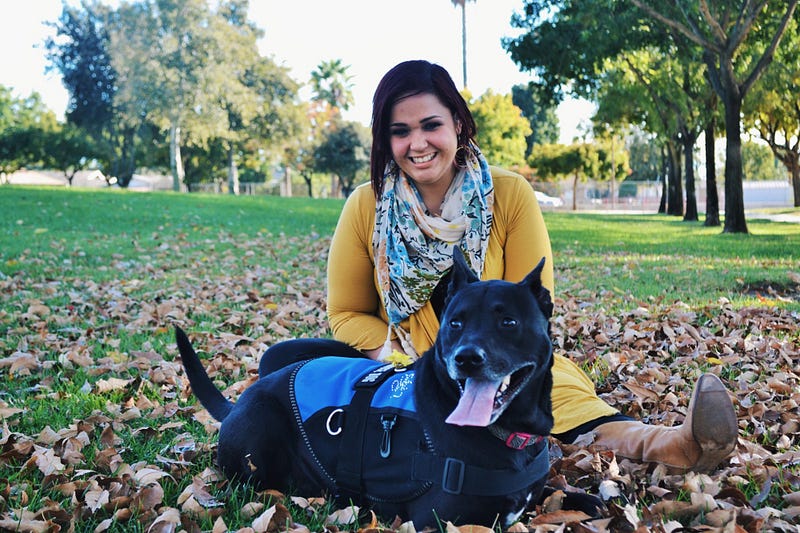Let Me Lick Your Stress Away
Four-legged friends ease college pressures
As college students, our schedules are consistently overbooked, sleep has become a luxury, and the amount of caffeine we consume could probably bring Frankenstein’s monster to life. We are a generation of sleepless nights, an insurmountable amount of essays, and the neurotic predisposition to determine a pass or fail based on how much information we can cram into our brains six hours before a final exam. There is no question that college life is stressful. What is surprising, however, is how college administrations have attempted to aid their student’s battle against the stress monster that is college life: they brought dogs to school.
In 2010, the University of California Riverside (UCR) hosted their first “Therapy Fluffies,” an event where they encouraged students to “de-stress” with one of several provided pooches they had brought to campus during finals week.
“In fall of 2010, we had about 350 students come out and every quarter it grows. Last quarter we were up a little over 600 students and today we’ll probably exceed that. So it gets more popular with students every quarter,” said Stacy Grady, mental health outreach coordinator at the university during a filmed interview at the event.
The event has been offered twice a semester since, during midterm and finals week. According to the the university’s student online news site, UCR Newsroom, last year’s event brought in nearly 1,000 students.
UCR Newsroom reported that it was a collaboration of the school’s Student Wellness Partners, Mental Health Outreach, and Active Minds, all programs geared to promote the total health and well-being of UCR students, who were responsible for bringing the event to the campus. The dogs were provided by the Inland Empire chapter of Delta Society Pet Partners, a group of trainers and therapy animals who visit the local hospitals, nursing homes, and physical therapy centers.
“You’re really stressed. You’re freaking out about everything. You’ve had no sleep. You’re frustrated because you have finals or midterms…and then you see this puppy and it makes you happy for like, five minutes of your life; and it calms you down,” said Christine Garavito, 22, a recent UC Riverside graduate.
Other California universities have caught on to this new trend and joined UCR in bringing these “stress puppies” to their campuses. Currently, the “stress puppy” solution to combat finals-week-stress has been adopted by multiple universities within the state, including: University of California at San Bernardino, University of California at San Diego, University of San Francisco and La Sierra University in Riverside.
And it doesn’t stop with California colleges.
Universities and colleges all across the country are promoting their own “stress puppy” events. Starting in 2006, Macalester College in St. Paul, Minn. asked faculty and alumni to bring their own fluffy friends to campus during finals week as volunteers at their “Dog Day Afternoon” event. In 2012, Indiana University launched their first “Rent-a-puppy” day where they charged students a $5 fee for the opportunity to hang out with one of the 20 puppies they had brought to campus from the local animal shelter. If the student and pooch just couldn’t part after their time together, the student could choose to adopt the dog as their own. The event not only gave students some stress relief but also helped several of the dogs find homes.
Kathleen Adamle, a nursing professor at Kent State University in Ohio, launched her own “Dogs on Campus” program in 2006 with just her own dog, but has since added 11 other therapy dogs to the program’s repertoire. She and her therapeutic friends visit dorms on a regular basis, not just during finals. In some instances, Adamle and the dogs will help students through tragedies on campus, comforting them as best as they can. She told USA Today, “I don’t care if it’s 10 at night, we go to that dorm and sit on the floor. The kids are crying, and they grab the dog and put their face in the fur and just let it go,” said Adalme.

Then there are the year-round therapy dogs. Cooper, is Harvard Medical’s live-in Shih Tzu and he is available for play time for two days out of every week. This helpful pup even has his own reservation page on the school’s library website. Cooper is so popular that many of the undergraduates have started petitioning for him to be able to spend some time on their side of campus. Many of them end up taking the shuttle across the river to the Harvard Medical’s library just to spend some time with the scarf-wearing pup, on the Tuesdays and Thursdays that he is available. Not far behind, Yale Law School, has a Jack Russell/Border Terrier mix, named Monty and Emory University brought in Stanley and Hooch, two golden retrievers in training to become companion dogs for disabled owners, to help their students deal with their stressful courses.
Recent studies conducted by the American Heart Association and Center for Disease Control confirm the validity behind this idea that animals can actually affect an individual’s health. According to these studies, pets can decrease blood pressure, cholesterol and feelings of loneliness. Therapy dogs can, and do, relieve stress and providing these dogs for the college students has proven to be successful in helping them calm down, most especially around finals week, and perform better on their final exams.
“Studies have shown that animals help reduce blood pressure, stress and anxiety levels. Less stress helps students to be more successful. Successful students stay in school and are more likely to be on track for a timely graduation. This helps universities and colleges that are facing impacted student populations and a budget crunch,” said Grady to UCR Newsroom.
Jessica Zitterkopf-Ormonde, a 22-year-old radiology major at Mt. San Antonio College, is the proud owner of a service dog and said she knows what it’s like to feel the everyday stress of being a college student.
“I know as a student myself; we tend to neglect our mental health. And mental health is such a huge factor in our well being. But I think as college students, we get so stressed and caught up in our school work…we forget about ourselves,” she said.

Zitterkopf-Ormonde is the owner of Winnifred, or Winnie, a three-year old Boston Terrier/Chow Chow/ Pharaoh Hound mixed-breed who is certified as a service dog in all 50 states. “She went to all of my Mt.SAC classes with me. And in one of my classes, she ended up being a therapy dog for every single person there,” said Zitterkopf-Ormonde. “By the third or fourth week in, everyone had made friends with Winnie. Even Dr. Knapp, the professor, on several occasions, if he was having a bad day, he would just sit with her on the floor during our break. She just calmed everyone down.”
Last year, Winnie helped save a student’s life. During Zitterkopf-Ormonde’s human sexuality class, a student was about to have a seizure. Winnie, sensing the impending attack, began to whine and bark, alerting the class that something was wrong. “The only reason I was able to get to him or help him in time was because she alerted me,” Zitterkopf-Ormonde said, recounting the event. “There’s different types of service dogs,” she explained, “The one that is most common, that most people think of, is your “seeing-eye dog.” But we are just now finding that dogs can do so much more.”
On top of detecting seizures, Winnifred lets Zitterkopf-Ormonde, who is hypoglycemic, know when her sugars are too low and reminds her to eat something. She also reminds her owner to take her medicine every night at 9:30 p.m. No matter where she might be, or what she might be doing, Winnie does not let up until she has taken the medication. She even helps with her owner’s problems with night terrors. Whenever she experiences a nightmare, Winnifred wakes, jumps out of bed, turns on the bedroom light, hops back into bed, and gently nudges her owner awake. “I’m never in that horrible state for too long because she knows and she’ll wake me up.”
But on top of her medical health, Zitterkopf-Ormonde attributes her mental health to Winnifred as well. “Even though the radiology program is 10 times harder than just my regular classes, I’m handling the stress a lot better than I did those other classes. And I know that it’s because I’ve gotten a handle on my mental health. Not to mention, I’m off of 90 percent of my medication. And we’re talking heavy stuff: Anti-depressants, anti-anxiety, anti-psychotics, Norco…and that’s mostly because of Winifred.”
A growing body of scientific research is showing that pets, like Winifred, can help improve both physical and mental health. One of the earliest studies, published in 1980, stated that heart attack patients who owned pets had a higher survival rate and lived for a longer period after the attack. More recently, Rebecca Johnson, a nurse who heads the Research Center for Human/Animal Interaction at the University of Missouri College of Veterinary Medicine, said in an interview with NPR on March 5, 2012, that human interaction with animals can increase our oxytocin levels. “That is very beneficial for us. Oxytocin helps us feel happy and trusting. Oxytocin has some powerful effects for us in the body’s ability to be in a state of readiness to heal, and also to grow new cells, so it predisposes us to an environment in our own bodies where we can be healthier,” said Johnson.

“They make me feel good. And they calm me down when I am feeling anxious,” said Daniel Perez, 15. Daniel has been a patient at the Children’s Hospital in Los Angeles, CHLA, for nearly four weeks. His stay in the hospital has meant that he missed this year’s Halloween and he will probably be unable to have a Thanksgiving dinner with his family.
“Fenton came in to Daniel’s room on Monday, Nov. 3. As soon as the dog walked into the room, not only did my son brighten up, but I was excited to see the dog as well. [He] jumped up on the bed with Daniel and proceeded to put his paw on his hand, lick his hand, and rub his head on his leg,” said Alisa Perez, Daniel’s mother.
Alisa Perez, 43, a human resources management major at Mt. San Antonio College, explained that the golden retriever seemed to have a calming effect on herself as well as her son. Daniel had had two visits from other therapy dogs prior to meeting Fenton, and with each visit he received a sort of therapy dog “playing card” with a photo of the dog, his or her name, and a short bio. “The dogs show unconditional love and enjoy the attention that the children give them as well,” said Perez.
Children’s Hospital of Los Angeles is just one of the many hospitals in the Los Angeles area who are welcoming the “Love on 4 Paws” volunteers. This nonprofit organization provides animal-assisted therapy to facilities all around the city, including: hospitals, schools, and rehabilitation centers
“I think there’s something about their innocence in that no matter what, they’re willing to be with you. They’re nonjudgmental,” Suni Cookson, a director for Love on 4 Paws told the Los Angeles Daily News in 2012. “People are shocked. They come into a hospital, they never expect to see a dog and all of a sudden a dog shows up and they just love to see them.”
Whether it be in a hospital or a college campus, these remarkable creatures are proving the power of the statement, “Man’s best friend.” Regardless to the personality of each person, their reactions tend to be the same – for a brief moment, any stress that they feel, any worries they may have, any discomfort they may be experiencing… it is all placed on hold.
“If you want to see how much a dog can help someone, just look at someone, whose just had the most horrible day go home to their dog. Because as soon as their front door opens, they see their dog and everything else just melts away. It’s just pure happiness. Dogs love unconditionally and you don’t get that all that often from the rest of the world,” said Zitterkopf-Ormonde.
Few people think about how their own four-legged pal has helped them battle down their anxiety. Even fewer would guess that a dog can be one of the best treatments for human anxiety, depression, and stress. And no one really expects to see a dog on a college campus, let alone in a hospital. People may not think about it, guess it, or even expect for dogs to be the best new addition to a college campus but there is no doubt that everyone is always glad to see them there.
Substance is a publication of the Mt. San Antonio College Journalism Program. The program recently moved its newsroom over to Medium as part of a one-year experiment. Read about it here: https://medium.com/substance/the-experiment-be947b2ba13e







